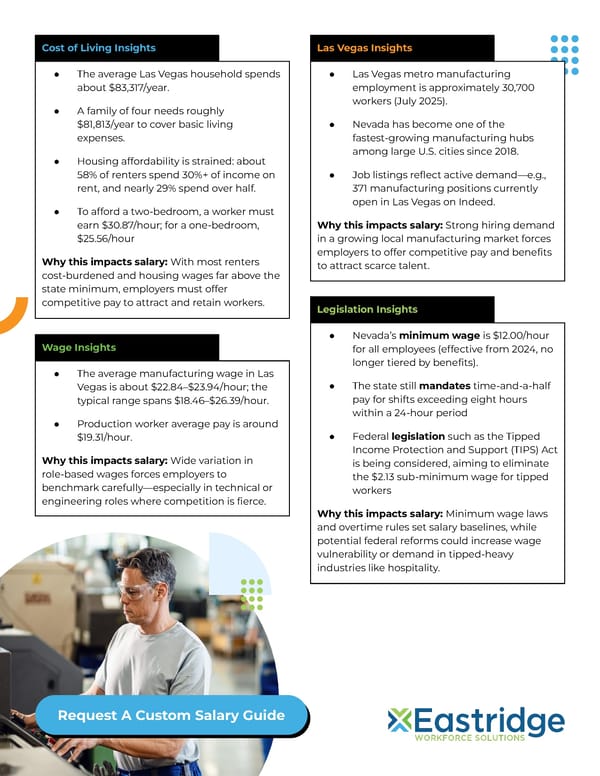● The average Las Vegas household spends about $83,317/year. ● A family of four needs roughly $81,813/year to cover basic living expenses. ● Housing affordability is strained: about 58% of renters spend 30%+ of income on rent, and nearly 29% spend over half. ● To afford a two-bedroom, a worker must earn $30.87/hour; for a one-bedroom, $25.56/hour Why this impacts salary: With most renters cost-burdened and housing wages far above the state minimum, employers must offer competitive pay to attract and retain workers. Cost of Living Insights ● Nevada’s minimum wage is $12.00/hour for all employees (effective from 2024, no longer tiered by benefits). ● The state still mandates time-and-a-half pay for shifts exceeding eight hours within a 24-hour period ● Federal legislation such as the Tipped Income Protection and Support (TIPS) Act is being considered, aiming to eliminate the $2.13 sub-minimum wage for tipped workers Why this impacts salary: Minimum wage laws and overtime rules set salary baselines, while potential federal reforms could increase wage vulnerability or demand in tipped-heavy industries like hospitality. Legislation Insights ● Las Vegas metro manufacturing employment is approximately 30,700 workers (July 2025). ● Nevada has become one of the fastest-growing manufacturing hubs among large U.S. cities since 2018. ● Job listings reflect active demand—e.g., 371 manufacturing positions currently open in Las Vegas on Indeed. Why this impacts salary: Strong hiring demand in a growing local manufacturing market forces employers to offer competitive pay and benefits to attract scarce talent. Las Vegas Insights ● The average manufacturing wage in Las Vegas is about $22.84–$23.94/hour; the typical range spans $18.46–$26.39/hour. ● Production worker average pay is around $19.31/hour. Why this impacts salary: Wide variation in role-based wages forces employers to benchmark carefully—especially in technical or engineering roles where competition is fierce. Wage Insights Request A Custom Salary Guide
 Workforce Insights: Las Vegas, NV Page 1
Workforce Insights: Las Vegas, NV Page 1 